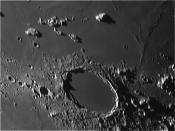The relationship between the mind and the body has been a constant discussion for many theorists for centuries. Some say that the mind cannot think without the body and the body cannot survive without the mind. Other theorists believe that the body and the mind are separate parts and therefore cannot exist together. The concept of the mind acts more as a perception to our inner brain and the body is a physical attribute that every live human being is consisted of. Most of the well known theorists go in depth with their explanations of how the mind and body should act in order to determine the real truth that society hides from us. Descartes', "Discourse Four," Plato's "The Allegory of the Cave," and Gardner's, "The theory of Multiple Intelligences," are all well known essays that argue and can, in fact, agree upon how the mind and body are either separated or linked to one another by the truths and reality based off of one's intelligence.
Descartes believes in seeking out the truth in the world. He speaks of how dreams differ from reality, and how dreams can stray people away from the real truth. Many see dreams as a way to get closer to their desires. Descartes states "that everything which is not within the realm of imagination seems to [us] unintelligible" (Descartes 463), meaning that, when people think, they only think for themselves and when they do, all they see are "the tangible things," and are used to what their imaginations brings them. Imaginations and the senses bring about different perceptions of how reality really is, and Descartes believes that these perceptions can no longer be trusted. In fact, we need our own understanding to determine the real truths in our society.
Descartes does believe that the mind the body cannot coexist together. He states that the mind can exist without the body and the body can exist without the mind. This relationship brings up the topic of how humans are not perfect and God is the perfect being. God has no body, so he does not have to rely on one, however he has a great mind and our "our existence must depend on his power" (Descartes 462). Humans, on the other hand, can never be as perfect as God, because they are held down by their imperfect bodies, and our minds are controlled by the one true God.
Plato, on the other hand, presents a different idea which states that the body and the mind go together, but can exist without each other. Plato says that the mind must be the center of all human thoughts and can exceed the body. In his essay, he says that one should escape what society says is true to gain true knowledge and understanding, and come back alive and well and share his experiences with the world. By this he means that we should only think and to stop using the senses around us to help find the way. One must determine from the difference between the real "Truth" and the "truth" that society and our senses blind us with. He compares his theory to the idea of people being trapped in a dark cave. What they see is the reflections on the wall and that is what they believe is to be the truth of reality. However, when one is let go he realizes that the reflections on the wall were lies and he discovers the real "Truth" to society. Plato depicts him as a philosopher who has seen a new light and has an understanding what is really happening in the world around him and the people trapped in the cave. He tries to convince the others to flee with him and says that thinking is better than believing in the senses and the reality that is placed in front of them and upon the walls. This idea would ultimately progress the outside society. Plato ultimately believes that thinking without senses can only better everything in one's life.
Plato believes that all knowledge can be derived from the truth. Knowledge rests on the real "Truth," unlike Descartes, where one's self is the way to "Truth". Plato compares the powers of the real truth to the power of the sun. The sun enlightens our world to the real truth and makes them visible to one's eye. The absolute truth can illuminate things of the mind and makes them intelligible. This is where Descartes and Plato differ, because Descartes believes that one cannot use the mind to think of intelligible things, rather when one does use it he is only seeing imaginations that seem meaningless to the world and reality. According to Plato, the real truth, or the power of the sun, is too much for humans to understand. Plato's idea of the sun being the absolute truth is somewhat similar to Descartes belief on how God is the creator of himself and must be the creator of all things as well.
Descartes and Plato cannot relate on how the mind the body work. Descartes believes that the mind can exist without the body. Plato however, says that one should leave the body, and only think with the mind. When that person has learned everything there is to know he must be like the philosopher for his lost people and be the one to free the people and show them the "sun" or true light. Once a person has gained enough knowledge on either a certain topic or everything there is to know he must then return to reality where he must partake in society and better it in some respects. One would do this by intelligence that he has gained through his mind.
Gardner is a theorist who thinks differently than Descartes, but on the same level as Plato. Gardner believes that the body and mind can work together. He believes this based off of another theory of his called "the seven intelligences" (Gardner 522). He believes in the saying that a person does not have to have perfect scores all the time to be labeled as an intelligent person. Rather, he believes that people work in different ways based off of how their mind and body communicate together. He brings up how the mind and body communicate through people's musical, bodily-kinesthetic, logic and mathematical, linguistic, spatial, interpersonal, and intrapersonal intelligences. These attributes are the key factors to his theory of "the seven intelligences." If we take the theory of bodily-kinesthetic intelligence as an example, Gardner describes that athletically and functionally, one must have full control of their mind and body in order to attend to their duties in the world. One needs both their mind and body to be working at the same time so that one can process normal thinking patterns more effectively and make better judgments.
Gardner believes that one must understand the senses through the mind. This means that in order to fully understand it, one has to put himself to a test of knowledge on that certain topic. If we go back to the bodily- kinesthetic intelligence, one must go through extensive training with some kind of help to achieve ultimate greatness; however one can just be born with such a great talent that there is no need for any outside help. This mean that the mind and body are working together, however many are just born with that certain talent.
Plato and Gardner have, to some extent, the same view point on how the mind and body are related. As stated before, Plato believes that one must leave the cave or their "comfort zone" to find the real truth and to better understand what reality really is. This means that one uses more of their mind and thoughts then their physical body. Plato describes how the people living in the cave use more of their senses then their actual intelligence. Gardner believes the same, but he feels that the mind and the body should work together to create a sense of intelligence in a human being. Gardner believes one can be born with a natural talent, but the intelligence and the talent level may be better off with some help and guidance from outside forces. For example, one cannot truly believe that they are a natural at playing basketball by one single thought or dream. If that were the case, many of us would be professional athletes, however, only with the help of some outside forces can this dream become a reality for many of us. He also believes that we all have some level of intelligence when we put both our mind and body together. According to Plato's theory, Gardner goes against how the mind and body should act. Plato believes that the body is used for expressing ones thoughts through actions and such while the mind is used for in depth thinking, and they never should coexist. Gardner feels that people should learn through their senses and mainly the world around them, instead of strictly the mind and the body acting differently from each other.
One can say that both Gardner and Plato initially agree on the fact that there should be some existence with the mind and the body working together. In order to think and greater one's intelligence the mind and body must act together. However, Gardner feels that one needs their senses in order to develop their intelligence, while Plato feels that using the mind and thinking will develop one's intelligence much better than if the senses were just used. Descartes believes in the total opposite saying that the mind can exist without the body. He states that through the existence of dreams and imaginations in the mind can actually happen without the body being fully functional.
Above all, these theorist's ideas are distinctively different when it comes to explain how the mind and the body work. The relationship between the mind and body may never be truly defined because of its complexity, and one will always have a hard time determining the true existence of the mind and the body and how it will relate to the truths of our society. The arguments of this discussion can, in fact, go on for a lifetime and many will never truly understand the complete relationship between the two.
Work Cited1.Descartes, Rene, "Discourse Four." A World of Ideas. Ed. Lee A. Jacobus. Boston:Bedford/Saint Martins, 2006. Pages 460-65.
2.Plato, "The Allegory of the Cave." A World of Ideas. Ed. Lee A. Jacobus. Boston: Bedford/Saint Martins, 2006. Pages 445-533.Gardner, Howard, "A Rounded Version: The Theory of Multiple Intelligences." A World of Ideas. Ed. Lee A. Jacobus. Boston: Bedford/Saint Martins, 2006. Pages 519-33.


